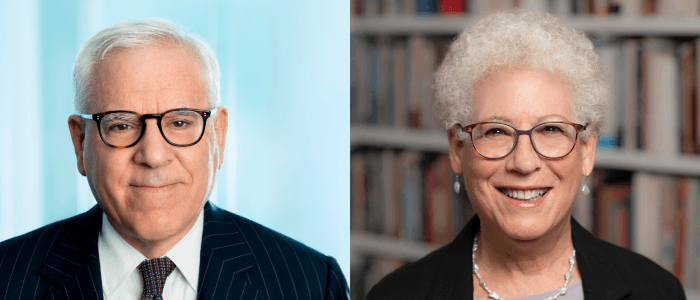IN-PERSON SOLD OUT - An Evening with David Rubenstein: John B. Paine, Jr. Annual Lecture on the History of Business & Innovation

MHS Event
David Rubenstein in conversation with Dr. Lizabeth Cohen, Harvard University
In-person registration is SOLD OUT but you can still register to join us online.
This is a hybrid event. FREE. The in-person reception starts at 5:00 and the program will begin at 6:00.
Join us for the inaugural John B. Paine, Jr. Annual Lecture on the History of Business and Innovation with a very special guest. David Rubenstein is the Co-Founder and Co-Chairman of the Board of Carlyle Group Inc., a global investment firm and leader in private equity. Rubenstein will be in conversation with Dr. Lizabeth Cohen, the Howard Mumford Jones Research Professor of American Studies at Harvard University. Together, they will discuss Rubenstein’s New York Times bestseller How to Invest: Masters on the Craft.
David Rubenstein is one of the most trusted voices in the investment world. He is the CEO of the Major League Baseball team the Baltimore Orioles and the Chairman of the Boards of the John F. Kennedy Center for the Performing Arts, the Council on Foreign Relations, the National Gallery of Art, the Economic Club of Washington, and the University of Chicago, among other philanthropic endeavors. In How to Invest: Masters on the Craft, Rubenstein interviews the biggest names in finance to discover the time-tested principles, hard-earned wisdom, and indispensable tools that guide their practice.
Dr. Lizabeth Cohen is a Harvard University Distinguished Service Professor in the Department of History at Harvard. From 2011–18 she was the dean of the Radcliffe Institute for Advanced Study. Among many awards and honors, Cohen has been a fellow of the Guggenheim Foundation, the National Endowment for the Humanities, the American Council of Learned Societies, and the Radcliffe Institute for Advanced Study.
John B. Paine, Jr. (1901-1976) was an investment advisor and served as a Trustee of the Massachusetts Historical Society, where he was the Treasurer from 1957 to 1970. His papers are held at the MHS.
In-person registration is SOLD OUT.
Hybrid Event. The in-person reception starts at 5:00 and the program will begin 6:00 PM. If you have questions about the in-person event, please contact Olivia Sayah at 617-646-0580, or osayah@masshist.org. The virtual program will be on the streaming platform YouTube and begins at 6:00 PM. Registrants will receive a confirmation message with attendance information.
By registering you are agreeing to abide by the MHS Visitor Code of Conduct.
